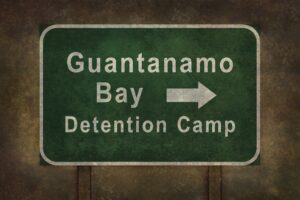Guantanamo's Injustice Grinds On
 By Brian Dooley,
By Brian Dooley,
Senior Policy Consultant
Exactly ten years ago, I spent a week at the notorious Guantanamo Bay for Human Rights First, observing court hearings for five men accused in connection with the September 11, 2001, attacks on the United States.
Almost 3,000 people were killed in four coordinated hijacked plane attacks by Al Qaeda that day on the World Trade Center in New York and on the Pentagon in Washington, DC. Another hijacked plane crashed in Pennsylvania.
In the court in 2015, the accused sat one behind the other, with Khalid Sheikh Mohammed at the front, nearest the judge, Walid Bin Attash immediately behind him, Ramzi Bin Al Shibh behind him, then Ammar al Baluchi, and finally Mustafa Hawsawi at the back.
Guantanamo’s a very peculiar place, a U.S. military base perched on a corner of Cuba, an outpost of cruelty, and a long-running symbol of American waste and incompetence. It has come to represent what much of the rest of the world sees as the worst of America – a country playing by its own rules, refusing to be bound by the international standards it had agreed to, ignoring its obligations under the Universal Declaration of Human Rights, including Article 10’s right to a fair trial. The pretrial hearings for the men charged with mass murders are still going on, a decade after I was in court, and 24 years after the crimes.
My colleague, Josh Colangelo Bryan, will soon release his new book, Through the Gates of Hell: Injustice at Guantanamo Bay, published by Humanitas Media. This book is about the experience of being a lawyer representing prisoners who, unlike those charged in the case I observed, were never accused of any crimes. It details the misery and absurdity of Guantanamo.
When I visited Guantanamo, President Barack Obama was in the White House. It was clear that the Guantanamo court and the detention operation in general, set up by his predecessor, George W. Bush, were seriously harming Washington’s reputation all over the world. It was a propaganda gift for America’s enemies. One former U.S. ambassador to the United Nations told me in the first year of their job, the name of Guantanamo was brought up in every meeting they had with foreign diplomats. Obama promised to end the hell of Guantanamo by the end of his presidency and failed.
Instead of transferring the men accused in the September 11 attacks and other Guantanamo inmates, separate federal charges were filed against them. The United States has persisted in keeping the cases there. More than twenty-four years after the attacks, the actual trial still has not started.
The men are still stuck in pretrial hearings while the court figures out what evidence is admissible and how it will select a jury. Back in 2015, US Brigadier General Martins said the process was “like watching grass grow.” An exasperated senior lawyer there said, “We’re edging along like an inchworm.” Things have not sped up since.
At the hearings I attended, nine people in the court were from the families of the almost 3,000 killed on September 11. More people have since died from diseases blamed on their work at the ruins of the World Trade Center. The families of those killed that day are well into their third decade of an excruciatingly painful wait for justice. Colleen Kelly of New York lost her brother William in the World Trade Center attack. “We have to show the world we’re doing this process properly, using the rule of law,” she told me. “Guantanamo should be closed down and these cases moved to federal courts; this courtroom isn’t the place for these trials.”
It has not happened. The case is still stuck in Guantanamo, with little sign of it concluding there. This one case has dragged on so long that four judges have come and gone in presiding over it. The case was split in 2023 when Ramzi bin al-Shibh was deemed unfit for trial.
In 2015, I asked soldiers who worked at the base, lawyers there, and other experts for their best estimate of when the pre-trial hearings in this case would conclude and the actual trial would begin. Responses ranged from 2018 to 2020 (which was the most popular guess). One lawyer joked, “Never!” That is now a wise guess. The defendants may all have died before the trial concludes or even starts. The U.S. could have fixed this problem twenty years ago by closing Guantanamo and giving the accused a fair trial in the federal court system. Instead, the Orwellian-sounding proceedings at “Camp Justice” grind slowly on with no resolution in sight.

